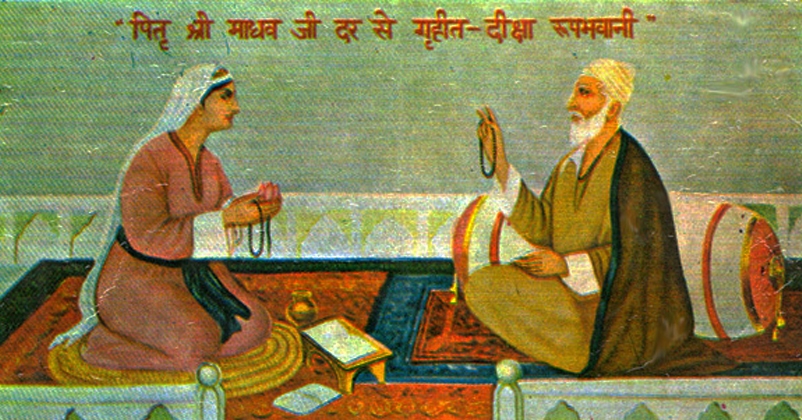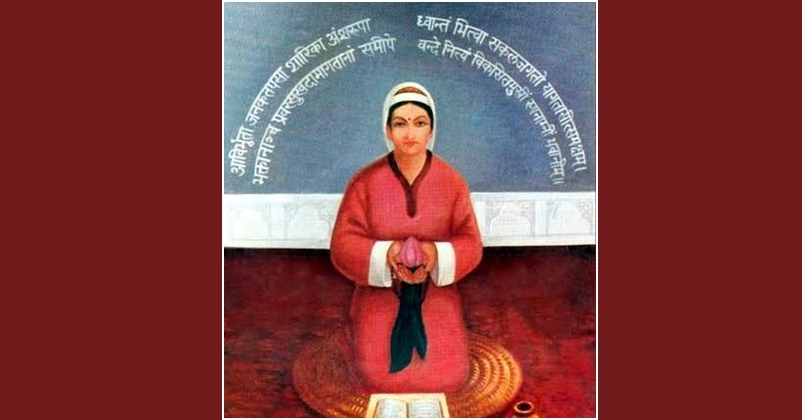Rupa Bhawani- When Devi Durga walked in her human form in Kashmir
29 Nov 2019 12:50:59

Chiranjeevi Karnail
In the list of saints of Kashmir and mystic poets of the 17th century, one name can never be missed. That is RupaBhawani as a radiant face and a tapaswini. Born as Alkheshwari in 1621 AD to Pandit Madhav Joo Dhar, resident of khankahiSokhta (Safakadal),Srinagar she was the second great mystic poet of 17th century. Legend states that Pandit Madhv himself a Devi-Bhakta, performed Parikarma of Hari Parbat regularly for years, praying to the MotherSharika to fulfill his aspirations. The Mata, pleased with his devotion, appeared to him one day saying "speak out your wish". He prostrated himself at the Mata's feet, imploring," Great Mother, Creator of the entire Universe; you are so kind to me, I wish you are born as my daughter". The wish as granted, and RupaBhawani graced his home on JyeshthaPooranmashi(Samvat 1681).
EARLY LIFE
Her father was held in high esteem and spiritual seekers from different provinces came to meet him.Her spirituality blossomed in these favourable conditions. As she grew older, the spiritual tendencies within her also developed very much. Her father himself became her guru and gave her spiritual initiation. Nevertheless, due to the prevailing customs of the time, her father arranged her marriage to a young man of the nearby Sapru family.
Married to a young man named HeeranandSapru, she had a very miserable married life. Due to her spiritual bent, misunderstandings came in their relationship. She often visited Hari Parbat to perform sadhna at midnight. Her mother in law also mistreated her. Ultimately, she left home and went in pursuit of God.

ALKHESHWARI BECOMES BHAWANI
She went to a village called Manigam and used to perform her saadhna in solitude at a place called ChashmeShahi. A cowherd boy used to take his cows to graze at a place which was near to Alkheshwari’s meditation spot. One cow left the herd every noon and later returned, one day he decided to see where she went. Following the cow, he reached there and saw her meditating. The cow stopped before her. The ascetic woman got up and touched the cow gently. The cow of her own accord poured milk into her bowl until it was full. By this time, she had completed around 12 years of spiritual practice there and became Bhawani for the people. People started to visit her but when she began to receive a great deal of public attention, she left the village, preferring to continue saadhna in solitude she went to dwell in a hut on the bank of Shahkolriver.
BHAWANI’S LESSONS IN POETRY
Once, someone came to her and asked her name on which she replied- My name is Roopa(one who has realised the true self). She lived there for some years but when large number of devotees started coming, she moved away to the village of Vaskora. In Vaskora, she began to give spiritual instructions to devotees in the form of poetical verses, called vaakhs. After twelve and a half years she returned to Srinagar on requests of her followers.
LAST DAYS
Years passed and then, Bhawani left her earthly attire on saptamitithi, in the month of Magha, in the year 1721. The day is since known as Sahib Saptami observed by all Hindus in Kashmir. She gave mystic poetry to Kashmiri language in which we can find the influence of Kashmiri Shaivism as well as Islamic Sufism. This divine woman and poetess had experienced the truth and then explained the same. Such mystics and there mystic poetry in every language is considered great even after centuries.
RUPA BHAWANI IN LITERATURE
Well known author, Mr.ShyamLal Sadhu in his biography of Mata Bhawani states that:
“With her mastery in Sanskrit, Persian and Hindustani, she was well-versed in Vedanta, Upanishads and Shaivism. Her vaakhs have come to us in the usual oral tradition. It is believed that the Hindi text entitled RupaBhavaniRahasyopdesha is the most detailed text available.’’
Later, in the book he says that:
“Her poetry appears to be rooted in her predestined role as a Yogini. It is in this role that she has touched the lives of common people since the days when she acquired fame for her miracles. Though RupaBhavani spent virtually the whole of her life in meditation and there is a little evidence that she ever attempted the art of composing poetry, the vaakhs which have come down to us as hers show definite signs of rare poetic genius and meditative maturity.”